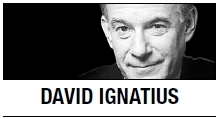WASHINGTON ― In his essay “Politics as a Vocation,” the German sociologist Max Weber famously wrote that “politics is a strong and slow boring of hard boards.” In this sense, it seems possible that Barack Obama has finally come to embrace the vocation of politics as he begins his second term as president.
I’m saddened by some of what Obama has learned on the way to becoming the politician who can drill those hard boards. I like his voice better when he tries to speak to all Americans, including the ones who didn’t vote for him, than when he offers a programmatic agenda, as he did in his second inaugural speech. I found his speech to mourners in Newtown, Conn., more presidential than his address Monday at the Capitol, precisely because it was less political.

But Obama didn’t get much for his post-partisan attempts to unite the country, other than gratuitous swipes from Republican legislators. At times over the last four years, he seemed like the last person in Washington to believe in the center. But no more. Now to the politics of the agenda, of the patient, dry-eyed battle to move forward on issues that matter to him: climate change, gay rights, economic justice, protection of social programs.
The country needs a president who can do more than advance, incrementally, a partisan agenda. An Obama who could somehow rally the country to restructure Medicare and Social Security so they can endure through the 21st century might be a great president. But Obama moved in another direction Monday.
Obama in his first term was an elusive character, with a dry and reticent manner that made you wonder if he really liked politics at all. Looking back, it seems evident that he was learning in those first four years, testing what worked and didn’t. My colleague David Maraniss, who is Obama’s wisest chronicler, wrote last weekend: “His mystery is hiding in plain sight. ... Behind his veneer of ultra-cool control he was struggling to figure things out.” And now, it seems, he is free to be himself.
Whenever I am trying to understand Obama, I go back and read his autobiography, “Dreams from My Father.” It is a remarkably clearheaded account of Obama’s search for identity, and the fiercely motivated, self-constructed person that emerged.
What caught my eye this time was Obama’s preface to the 2004 edition of the book, published just after he had been nominated to run for the U.S. Senate from Illinois. This was before the big train had left the station, in other words, and the phenomenon that is Barack Obama had been superimposed on the inner man. Obama was modestly describing the reaction to the initial publication of his book in 1995: “The reviews were mildly favorable. ... The sales were underwhelming” and the author was “glad to have survived the process with my dignity more or less intact.”
And now, Obama wrote in 2004, he was entering national politics as a Senate candidate, “a black man with a funny name.” The Sept. 11, 2001, attacks were still sharp in his mind, but he was wise enough to caution against overreaction: “I know that the hardening of lines, the embrace of fundamentalism and tribe, dooms us all.”
The Obama who came into the White House in 2009 was a hothouse flower. What he concealed, as Maraniss wrote, was his inexperience. This personality has now learned and evolved; he’s been in bitter fights with an implacable GOP leadership, Russian president and Israeli prime minister. The dreamer is gone, replaced by the politician. That’s the tougher, more doctrinaire person we watched take the oath of office Monday.
Weber gave his celebrated lecture about politics in 1919 in Munich, to an audience that had just come through a shattering war and was trying to find its bearings. He gave a companion talk about “Science as a Vocation” that emphasized its independence from politics. “The primary task of a useful teacher is to teach his students to recognize ‘inconvenient’ facts ― I mean facts that are inconvenient for their party opinions.”
But the person who would succeed in politics must have something different, an inner certainty born, sometimes, of failure. As Weber wrote: “Only he has the calling for politics who is sure that he shall not crumble when the world from his point of view is too stupid or too base for what he wants to offer.” This strikes me as an apt description of Obama, circa 2013.
By David Ignatius
David Ignatius’ email address is davidignatius@washpost.com. ― Ed.
(Washington Post Writers Group)








